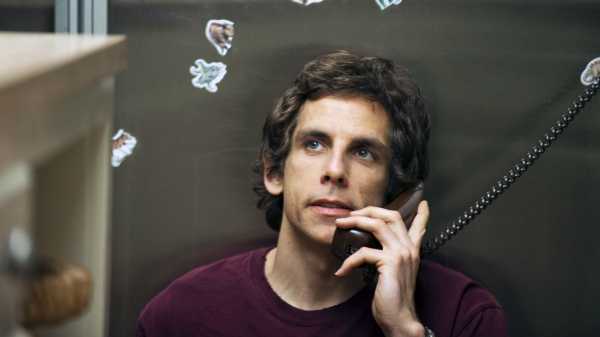
In Noah Baumbach’s newly released “Marriage Story,” Adam Driver and Scarlett Johansson play a couple who are going through a painful, protracted divorce battle. The movie portrays the dissolution of a marriage as a domestic catastrophe that doesn’t stem from either partner’s worst impulses, but that can happen even to good, loving people whose ambitions and needs end up at cross purposes. I enjoyed the film, but, as I watched, I sometimes felt that I would have found it more honest and complicated had I not felt that the baser, crueler instincts of the protagonists had been sanded down to an essential decency. As I exited the theatre, I realized that the poisonousness and discomfort I was missing—the depiction of complex human characters driven near-mad by spite and lust and jealousy and loathing and bitterness—were already in an earlier Baumbach movie. I went home and rewatched “Greenberg.”
In a Profile of Baumbach in this magazine, in 2013, my colleague Ian Parker noted that when “Greenberg” was released, in 2010, some viewers found it so distasteful that a theatre in which it was being shown was compelled to post a sign reading “We must limit refunds to an hour past start time.” (The movie will be screened next week at the Metrograph, in New York, where Baumbach is doing a residency.) As one of the film’s stars, Greta Gerwig, suggested in the same Profile, “Greenberg” is the sort of movie that “will make you feel perhaps uncomfortable about choices you’ve made in your life.” But while it’s true that, with its savage portrait of a man’s noxious narcissism, “Greenberg” can be unpleasant to watch (my editor, when I told him that I wanted to write about how much I love the film, said, with some surprise, “Interesting pick!”), its power lies exactly in its ability to perform the subtle balancing act of rendering its protagonist no less sympathetic for being toxic.
That titular protagonist, Roger Greenberg (a tightly coiled Ben Stiller), is a loser, and he knows it, and it’s absolutely killing him. He was once a promising musician, until he blew up a record deal that could have set him and his bandmates on the path to stardom. (“It was corporate bullshit!” he still insists.) Now that he’s forty and working as a carpenter, the only thing that matches his self-hatred is his stubborn self-aggrandizement. “I work out of a studio in Bushwick that I share with a few other carpenters. . . . That’s been pretty good,” he tells Beth, an old girlfriend (Jennifer Jason Leigh, who has a co-writing credit on the movie), before adding, offhandedly but pompously, “It’s political, though.” After being hospitalized for a nervous breakdown, he emerges from a mental ward and travels to Los Angeles for an extended stay, to house-sit the lavish home of his much more successful younger brother. “Recently, I had this thing where I couldn’t move my legs,” he says to Beth, apropos of nothing, during the same conversation. “But it was psychological.”
We hear nothing more about this episode, but the easy combination of such seemingly throwaway tidbits, which swing within the span of one conversation from the obnoxious to the heartrending and back, is part of the movie’s understated sketching of a multifaceted character. Greenberg is a nightmare—a self-obsessed mansplainer who is embarrassingly entitled, and whose self-awareness is flickering at best—but his vulnerability is recognizable, even poignant. At one point, he tells his kindly friend Ivan (the casually terrific Rhys Ifans) that “life is wasted on people”; and, indeed, who among us hasn’t been disillusioned by adulthood, and by what seems to us, whether correctly or not, others’ blithe, easy acceptance of its limitations? Of course, Baumbach allows us to identify with this side of Greenberg only to almost immediately pull the carpet out from under our feet, by having him throw a hissy fit at a restaurant after Ivan has a candlelit birthday cake brought to him by a host of singing waiters. “I’m not one of these preening L.A. people who likes everything to be about them,” he complains to his brother’s assistant, Florence (Gerwig, who is lovely here, in her first big mainstream role), as she drives him home.
The centerpiece of the movie is Greenberg’s sort-of relationship with Florence, who is a young, not-very-ambitious aspiring singer. Florence is as loose as Greenberg is uptight, and her dreams and disappointments are as fuzzy as his are acute. Their encounter serves less as a fully realized bond in which each partner affects and changes the other and more as a chance for Baumbach to showcase the highly particular, highly recognizable attributes of both. “I don’t read enough; I’m such a bad reader,” Florence, who listens to mainstream soft rock and hasn’t seen any so-called important movies, tells Greenberg. (“You like old things,” she says to him, after he gifts her a mix CD brimming with relative obscurities of decades past.) But she is also a much kinder and freer person than he is—the sort who is responsible and caring enough to keep an ailing dog’s complicated medication schedule straight, while still delighting in the animal’s beast-like corporeality. (“His tongue is so scratchy!”) The movie treats her character’s foibles and charms with an affectionate but clear-eyed remove.
“Greenberg” is, among other things, a satire—a spot-on taxonomy of the many different ways in which the white, privileged, and artsy members of the haute bourgeoisie can be unbearable—and the movie’s best extended scene, to my mind, is one in which Greenberg ends up hanging out with a gaggle of millennials at a house party. The secondhand embarrassment I feel for him every time I watch it is nearly debilitating, but it lands the familiar notes of “older person hanging out with younger people” so well that I can’t look away. “I read an article—are you guys all just fucking on the Internet?” he asks the crowd, before proceeding to do a line of cocaine (“This is good coke”), gulping down a Vicodin, and flirting aggressively and awkwardly with teen girls. (“Fight or fuck?” he asks one of them, making a karate-chop gesture and eliciting titters from the bratty college students around him.) Greenberg ends the night by leaving a long, musing message on Florence’s answering machine. “When I was a kid, I was a leader. My mom said other kids looked up to me,” he says, spectacularly navel-gazing. But then he goes on. “I just don’t understand. What happened to me? Where does experience go?” The questions are self-indulgent, but they still strike a nerve. What does happen to us when we grow older? Where does experience go? Greenberg is an asshole, but every time I rewatch this scene, it hits keenly.
Sourse: newyorker.com



